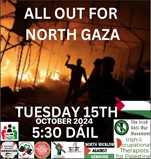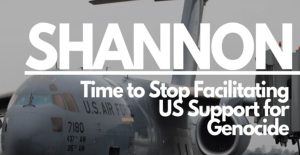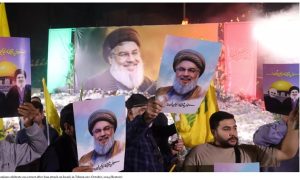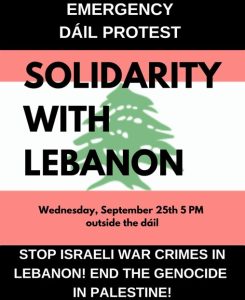DRAFT Platform paper of the international coalition “No to war – No to NATO”[1]
3rd draft 3rd draft
DRAFT Platform paper of the international coalition “No to war – No to NATO”[1]
3rd draft 3rd draft
NATO is a child of the Cold War and the confrontation of blocks. After more than 60 years of existence, NATO is an increasing obstacle to achieving world peace. Since the end of the Cold War, NATO has reinvented itself as a tool for military action by the “international community”, including the promotion of the so-called “war on terror”. In reality, it is a vehicle for US-led global dominance via use of force with military bases on all continents, bypassing or co-opting[2] the United Nations and the system of international law, accelerating militarisation and escalating arms expenditure – NATO countries account for 75% of global military expenditure. Pursuing that expansionist agenda since 1991, designed to advance strategic and resource interests, NATO has waged war in the Balkans, under the guise of so-called “humanitarian war”, and since 2001 has waged a brutal war in Afghanistan, where the tragic situation is escalating, and the war has expanded into Pakistan.
In Europe, NATO is worsening tensions, feeding the militarism with so-called “missile defence”, a massive nuclear arsenal and a nuclear first strike policy. European Union policy is increasingly tied to NATO, especially since the Lisbon Treaty has come into force[3]. Through the Partnership for Peace, Individual Partnership Action Plans[4], the Istanbul Cooperation Initiative (ICI), the Mediterranean Dialogue, and so-called “Contact countries”[5], NATO has woven a global web spanning almost all continents[…]. NATO’s ongoing and potential expansion into eastern Europe and beyond, and its “out of area” operations are making the world a more dangerous place. The conflict in the Caucasus is a clear indication of the dangers. Each advance of the NATO border increases the possibility of war, including the use of nuclear weapons.
The old NATO born out of confrontation of the two blocks with arms race, nuclear missiles, and nuclear war plans lost its function at the end of the Cold War. The new “global NATO” threatens hundreds of thousands, even millions of people and the environment, prevents the demilitarization of international politics, and blocks solutions to global challenges.
The international network “No to war – No to NATO”
The international network “No to war – No to NATO” is an international network[6] of groups and organisations from a wide political spectrum united in their opposition to NATO, NATO’s war in Afghanistan, and NATO’s increasingly aggressive role globally. It is open to all groups and organisations who share our opposition to NATO, as long as they do not support oppressive regimes or ideologies, and do not practice or endorse racism, sexism, and other forms of oppression[7].
While the network itself does not have a position on the use of violence in general (e.g. military defence, liberation and independence struggles), the network is committed to only use non-violent means in its activities against NATO: demonstrations[8], civil disobedience and nonviolent direct action, conferences, education, and other activities. Our fight against NATO is a fight for a more peaceful world.
To achieve our vision of a peaceful world, we reject military responses to global and regional crises – these are part of the problem, not part of the solution[9]. Instead, we need an international collaboration based on respect for international law and the sovereignty of nations. We refuse to live under the terror of nuclear weapons, and reject a new arms race. A drastic decrease of military expenditure is necessary – directing resources instead to meeting human needs. We must close down all foreign military bases, and all military structures used for war and military intervention. We call for the abolition of NATO: it should be dissolved and dismantled[10]. We must democratise and demilitarise the relations between peoples, push for conflict resolution and common security, and establish new forms of peaceful cooperation to build a more secure and just world.
Draft v0.9.1, 22 March 2010
Draft by Andreas Speck, partly based on the Stuttgart Appeal (5 October 2008) and the Strasbourg Declaration (4 April 2009)
[1] Responses received and considered:
– Cynthia Cockburn, 12 January 2010
– Claire Chastain, 12 January 2010
– Annie McStravick, 12 January 2010
– Manuel Baptista, 12 January 2010
– Joseph Gerson, 12 January 2010
– Annie McStravick, 10 March 2010
– Cynthia Cockburn, 12 January 2010
– Claire Chastain, 12 January 2010
– Annie McStravick, 12 January 2010
– Manuel Baptista, 12 January 2010
– Joseph Gerson, 12 January 2010
– Annie McStravick, 10 March 2010
[2] See comment by Cynthia. She pointed out that ISAF in Afghanistan actually has a UN mandate.
[3] Comment by Claire Chastain. I changed the wording slightly.
[4] On 29 October 2004, Georgia became the first country to agree an IPAP with NATO. Azerbaijan agreed one on 27 May 2005, Armenia on 16 December 2005, Kazakhstan on 31 January 2006, and Moldova on 19 May 2006. Early 2008, two Balkan countries — Bosnia and Herzegovina, and Montenegro — started working with NATO on developing IPAPs. Montenegro presented its IPAP to NATO in June 2008. From http://www.nato.int/cps/en/natolive/topics_49290.htm?selectedLocale=en
[5] At present at least Australia, Japan, the Republic of Korea and New Zealand
[6] Joseph Gerson commented: “Because the American Friends Service Committee is a large and complex organization, the process of gaining National Board approval for formally joining coalitions is not easily traversed. Joining networks is not a problem. Has the distinction between being a coalition and a network and the advantages/disadvantages of each been discussed? If not, and if people would accept a becoming a network, the process here would be greatly facilitated. I will, of course, understand if people think it necessary to be a coalition.” I think in practice we are more a network than a real coalition. So I changed that. What do people think?
[7] There were several comments on this one: Cynthia suggested to add: “and do not practice and endorse racism and sexism.” Annie in her email from 10 March was opposed to this addition (She wrote: “Regarding CC’s comments here, personally I do not think the phrase "and do not practise or endorse racism and sexism" should be added on to that sentence – in fact I would opt for ending it with the word "ideologies". We are an anti-war movement. I’m sure we are also against many other things: paedophilia, homophobia, bonded labour, forced marriages, islamophobia, and all the rest. There exist many other platforms for combatting those things, and I really do think that our No to NATO platform paper should stick to the point…..! “ I disagree with Annie, and think this is an important clarification. I agree that we are an anti-war movement, but this is more about who can be a member of our network. And I don’t think we want groups that practice or endorse racism, sexism, homophobia, bonded labour, forced marriages, islamophobia, etc as part of our network – or do we? That doesn’t mean that this is a focus of our work, though.
[8] Claire Chastain suggested to add “peaceful” in front of demonstrations. I think as we have a commitment to non-violent means before, this is not necessary.
[9] There has been some discussion on this phrase, which has been taken from the Stuttgart declaration. Annie said in her email: “There seems to be something wrong with the underlying assumption in this sentence, especially the use of the word "responses":
"To achieve our vision of a peaceful world, we reject military responses to global and regional crises – these are part of the problem, not
part of the solution."
"To achieve our vision of a peaceful world, we reject military responses to global and regional crises – these are part of the problem, not
part of the solution."
This makes it sound as if "crises" suddenly arise, and as if military action is then taken afterwards. We must surely recognise that 99% of such "crises" have been created by military action carried out by the US unilaterally or by the US-dominated NATO. (And, of course, covert actions designed to destabilise certain countries.) We only have to witness the current global crisis created by one superpower, bombing and rampaging through several countries in an unbridled fashion and preparing to do the same in even more.
Could we say instead something like:
We reject the deliberate fabrication of false threats and crises followed by military action supposedly designed to "resolve" them.”
Manual replied to this:
“Annie: I understand and agree to a point, but it seems to me that your formulation is rather complementary to the sentence you quoted from the initial draft.
This, because we should say in a clearly that we don’t believe that any true solution to global, regional or local crises can be attained by military means, but only through the mutual respect and real williness to achieve peace. There is no peace attainable with means of war. «Making war to have peace» is a cynical and brutish fallacy.
Could we keep both sentences?
«To achieve our vision of a peaceful world, we reject military responses to global and regional crises – these are part of the problem, not part of the solution.
Furthermore, we reject the deliberate fabrication of false threats and crises followed by military action supposedly designed to "resolve" them.»”
My own position is that just adding the sentence suggested by Annie doesn’t really solve it – it might lead to more confusion. It is correct that often a crisis is the result of the politics of the US, EU, or other major powers, but not always. To go into this discussion here what go beyond what I think it possible in a platform paper. I therefore suggest to stick to the phrase from the Stuttgart declaration.
[10] Claire Chastain suggested this additional sentence. This was controversial in Stuttgart – how do feel people about it now?






